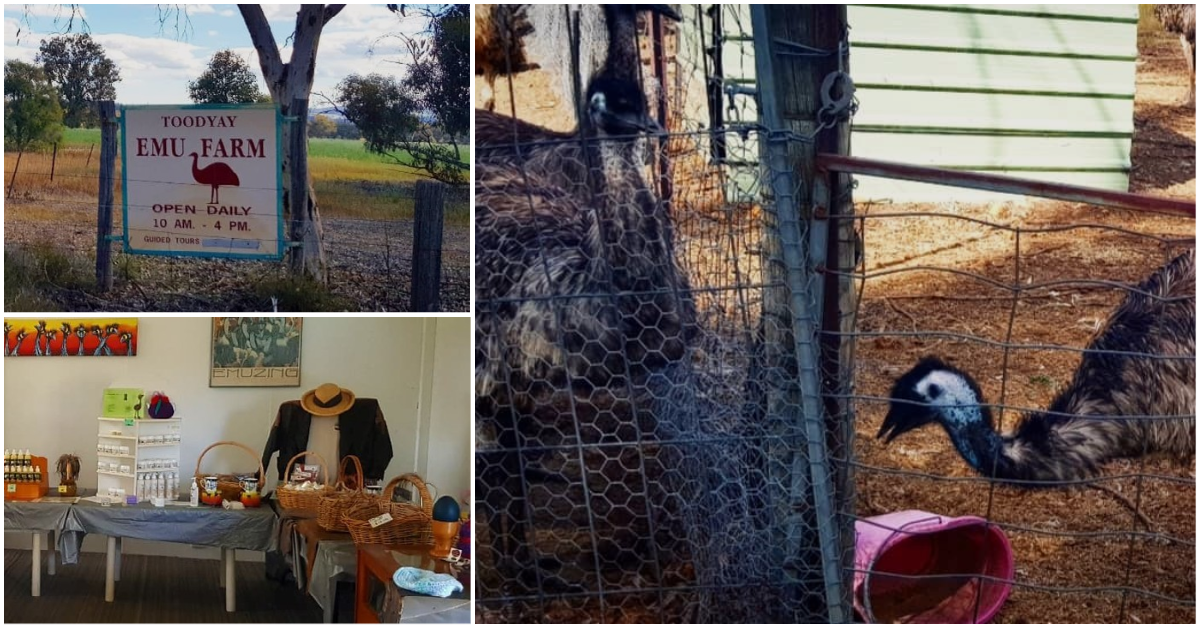Published on Thursday, 15 October 2020 at 10:00:00 AM
What do the Commonwealth Coat of Arms, a series of illustrated children’s books and a scenic property on Clackline-Toodyay Road have in common? The answer is emus, but don’t worry if you didn’t figure it out. Many people are surprised to learn that traveling just 10 minutes out of Toodyay (in the right direction, of course) will take them to the Free Range Emu Farm, the oldest continually-operating farm of its kind in the country. Stop by and you’ll see an iconic Australian animal in the flesh – or rather, feathers. Actually, you’ll see a fully-fledged flock of the flightless birds. But there’s much more to the site and to the story than that.
Kip and Charmain Venn are the brains behind a bird-breeding business that began almost thirty years ago, after a decade of planning and preparation. Kip had switched from sheep stations to emu enterprises by 1976, when he worked as a manager and researcher at Wiluna Emu Farm. Four years later, he and Charmain were settled on their Toodyay property – a peaceful block bordered by the rolling hills the Avon Valley is famed for – and began looking into farming emus in their expansive backyard. Familiar with animals of the four-legged and two-legged type, they were quick to realise the ease of raising and profiting from emus in comparison to sheep (emus take up half the space and are far less fussy where food is concerned). The pair’s first flock – 100 emus sourced from a farm in Helena Valley with the help of the CSIRO – produced a staggering 1000 chicks in a single laying season. That’s a fair few extra eggs on top of a baker’s dozen.
Fast forward to 1987, and the Venn’s Free Range Emu Enterprise was granted one of the first commercial licences to farm the animals in Australia. In 1991, the farm’s front gates were officially opened to the public and the rest is (a fairly happy) history. Kip and Charmain have had people eager to make feathered friends – and take home an egg-citing souvenir – making pit-stops at their property ever since. Over 1000 people per year specifically, with most making the trip from outside of Toodyay and according to Kip, ‘coming and going with the green grass’, though the farm tends to have a spike during the summer holidays too.
In terms of flock figures, you’ll find 80-100 emus on the farm these days, with fifty or so chicks born each year. Sixty acres of land to themselves lets the birds live like their wild relatives, though the safety that comes with captivity means they tend to live longer. Kip has watched countless emus grow out of their stripes (rather than earning them) and into adulthood in his forty years of emu-farming experience. His guided tours are sure to teach you a thing or two that will help you win a trivia quiz one day: for example, the fact that male emus are on daddy duty as soon as the females’ eggs have been laid. They don’t count the eggs before they hatch (as we’re all warned not to) but incubate and protect them for 56 days, barely moving a muscle…and they deserve an above-average Father’s Day present for continuing to raise their chicks solo for 12-18 months after birth. Meanwhile, not-so-monogamous mum is already on the hunt for her next husband. Human nature? Not so much.
What is human nature is to be wary of emus and their stature/beaks/speediness (they’d definitely be pulled over by the police if they tried to sprint through a school zone). But at the Free Range Emu Farm, they’re just curious creatures secure in their own space. And if it helps at all, the farm is basically Toodyay’s own Jurassic Park. You won’t bump into Jeff Goldblum when you drop by, but emus are directly descended from dinosaurs and were used as movement models for the 1993 film’s animatronic velociraptors. Kip and Charmain’s emus are famous in their own right (though you’ll struggle to get an autograph out of them): WA author/artist Wendy Binks used them as inspiration for the characters in her Stripey series of children’s books, which are available to buy in the farm’s shop.
Also stocked on the shop’s shelves is a range of natural products made on the premises by Charmain herself, using emu oil as a key ingredient. The oil acts as a moisturiser, sunscreen, burn treatment, painkiller, antiseptic and anti-inflammatory, and Charm trained herself up as a herbalist to ensure she could make the most out of it. As a result, there’s not only pure oil on hand to purchase, but capsules, lotions, lip balms and soaps too – plus the best-selling Pain Relief Rub, which ‘walks off the shelf’ without any aches or discomfort, naturally. You can also take home edible or decorative eggs, feathers (in natural, dyed and duster form), emu meat and much more.
How much more? You’ll have to go and see for yourself. The Free Range Emu Farm can be found at 681 Clackline-Toodyay Road, where it’s open for touring and shopping from 10am - 4pm, seven days a week. Give Charmain and Kip a call on 9574 1415 to arrange your emu-sing experience, or visit freerangeemufarm.com.au for more information.

Back to All News